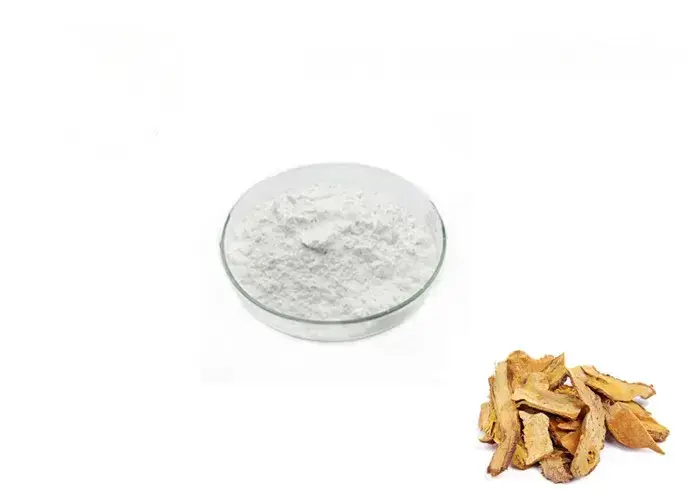How stable is Polygonum Cuspidatum 98% Resveratrol powder?
Polygonum Cuspidatum 98% Resveratrol powder, derived from Japanese knotweed, is a highly potent antioxidant with numerous health benefits. As a leading manufacturer and supplier, Avans NutriHealth Co., Ltd. is committed to providing premium quality resveratrol powder that meets the highest industry standards. However, one crucial aspect that often concerns manufacturers and consumers alike is the stability of this powerful compound. In this blog post, we'll delve into the stability of Polygonum Cuspidatum 98% Resveratrol powder, exploring its intrinsic properties, factors affecting its degradation, and best practices for storage and formulation. Understanding these aspects is essential for maximizing the effectiveness and shelf life of resveratrol-based products in various applications, including nutraceuticals, pharmaceuticals, and cosmetics.

Intrinsic Stability: solid-state resilience vs light, heat & humidity
Crystal Structure and Molecular Stability
Polygonum Cuspidatum 98% Resveratrol powder exhibits remarkable stability in its solid-state form due to its unique crystal structure. The trans-resveratrol molecules are tightly packed, forming a robust lattice that provides inherent protection against environmental factors. This crystalline arrangement contributes significantly to the powder's resistance to degradation, making it an ideal choice for long-term storage and various formulations. The stability of Polygonum Cuspidatum 98% Resveratrol powder is further enhanced by its high purity, as impurities can often act as catalysts for degradation processes.
Light Sensitivity and Protective Measures
While Polygonum Cuspidatum 98% Resveratrol powder demonstrates good overall stability, it is sensitive to light exposure, particularly UV radiation. Prolonged exposure to light can trigger isomerization, converting the more bioactive trans-resveratrol to its cis form. To mitigate this issue, Avans NutriHealth Co., Ltd. employs opaque or amber packaging materials that effectively shield the powder from light. Additionally, we recommend storing the product in a dark, cool place and minimizing exposure during handling and processing to maintain its potency and efficacy in various applications.
Thermal Stability and Humidity Resistance
Polygonum Cuspidatum 98% Resveratrol powder exhibits good thermal stability under normal storage conditions. However, extreme temperatures can affect its integrity over time. Our studies have shown that the powder remains stable at temperatures up to 40°C (104°F) for extended periods. Regarding humidity, the crystalline nature of the powder provides a natural barrier against moisture absorption. Nevertheless, we recommend storing the product in a dry environment and using desiccants in packaging to ensure optimal stability and prevent clumping or degradation due to moisture exposure.
Degradation Factors: pH, UV, isomerization, and temperature thresholds
pH Sensitivity and Buffer Systems
The stability of Polygonum Cuspidatum 98% Resveratrol powder can be influenced by pH levels in liquid formulations. Resveratrol tends to be more stable in slightly acidic to neutral environments (pH 6-7). In highly alkaline conditions, the compound may undergo oxidation, leading to a loss of bioactivity. To address this, Avans NutriHealth Co., Ltd. recommends incorporating appropriate buffer systems in liquid formulations to maintain optimal pH levels. This approach ensures the stability and efficacy of resveratrol in various products, from dietary supplements to topical applications.
UV-Induced Isomerization and Antioxidant Synergy
As mentioned earlier, UV exposure can cause isomerization of trans-resveratrol to its cis form. While both isomers possess biological activity, the trans form is generally considered more potent. To mitigate UV-induced degradation, we suggest combining Polygonum Cuspidatum 98% Resveratrol powder with other antioxidants, such as vitamin C or E. This synergistic approach not only enhances the overall antioxidant capacity of the formulation but also provides mutual protection against UV-induced degradation, ensuring a more stable and effective product.
Temperature Thresholds and Stability Profiles
Understanding the temperature thresholds for Polygonum Cuspidatum 98% Resveratrol powder is crucial for maintaining its stability during processing and storage. Our research indicates that the powder remains stable at temperatures up to 70°C (158°F) for short periods, making it suitable for various manufacturing processes. However, prolonged exposure to temperatures above 80°C (176°F) can lead to degradation and loss of potency. We recommend careful temperature control during formulation and processing to preserve the integrity of resveratrol in the final product.
Storage Best Practices & Formulation Strategies to Preserve Potency
Optimal Storage Conditions
To maximize the stability and shelf life of Polygonum Cuspidatum 98% Resveratrol powder, Avans NutriHealth Co., Ltd. recommends storing the product in a cool, dry place away from direct sunlight. Ideal storage temperatures range from 15°C to 25°C (59°F to 77°F). We provide our resveratrol powder in vacuum-sealed, light-resistant packaging to ensure maximum protection during transportation and storage. For bulk quantities, we suggest using airtight containers with desiccants to minimize exposure to moisture and oxygen, further enhancing the product's longevity.
Encapsulation and Protective Formulations
To enhance the stability of Polygonum Cuspidatum 98% Resveratrol powder in various applications, encapsulation techniques can be employed. Microencapsulation or nanoencapsulation can protect resveratrol from environmental factors and improve its bioavailability. These methods create a physical barrier around the resveratrol molecules, shielding them from light, oxygen, and other potential degradation factors. Additionally, incorporating resveratrol into liposomal formulations or cyclodextrin complexes can further enhance its stability and absorption, particularly in liquid or semi-solid products.
Quality Control and Stability Testing
At Avans NutriHealth Co., Ltd., we implement rigorous quality control measures and stability testing protocols to ensure the consistent potency and efficacy of our Polygonum Cuspidatum 98% Resveratrol powder. Our state-of-the-art analytical techniques, including HPLC and spectrophotometry, allow us to monitor the stability of resveratrol throughout its shelf life. We conduct accelerated stability studies to predict long-term stability and provide accurate expiration dates for our products. This commitment to quality assurance gives our clients confidence in the reliability and performance of our resveratrol powder in their formulations.
Conclusion
Polygonum Cuspidatum 98% Resveratrol powder from Avans NutriHealth Co., Ltd. demonstrates remarkable stability when proper storage and handling practices are observed. Its intrinsic solid-state resilience, combined with strategic formulation approaches, ensures optimal potency and efficacy in various applications. By understanding and addressing factors such as light sensitivity, pH, and temperature thresholds, manufacturers can harness the full potential of this powerful antioxidant in their products. With our commitment to quality and expertise in resveratrol production, Avans NutriHealth Co., Ltd. remains a trusted partner in delivering stable, high-performance resveratrol solutions for the nutraceutical, pharmaceutical, and cosmetic industries.
At Avans NutriHealth Co., Ltd., we take pride in being a leading manufacturer and supplier of premium plant extracts, nutritional supplements, and cosmetic ingredients. Our state-of-the-art R&D facilities, dedicated production teams, and stringent quality control measures ensure that we deliver products of the highest quality to our global clientele. With certifications including ISO, USDA, HACCP, FSSC22000, and HALAL, we demonstrate our commitment to excellence and regulatory compliance. Our annual production capacity of 1,000 tons and a team of over 100 skilled technicians allow us to meet diverse customer needs efficiently. For more information about our Polygonum Cuspidatum 98% Resveratrol powder or other products, please contact us at Lillian@avansnutri.com. Let us be your trusted partner in developing innovative, high-quality health and wellness solutions.
FAQ
Q: What is the recommended storage temperature for Polygonum Cuspidatum 98% Resveratrol powder?
A: The ideal storage temperature range is 15°C to 25°C (59°F to 77°F) in a cool, dry place away from direct sunlight.
Q: How does light affect the stability of resveratrol powder?
A: Light exposure, especially UV radiation, can cause isomerization of trans-resveratrol to its cis form, potentially reducing its bioactivity.
Q: Can resveratrol powder be used in liquid formulations?
A: Yes, but it's important to maintain a slightly acidic to neutral pH (6-7) for optimal stability in liquid formulations.
Q: What packaging does Avans NutriHealth use for its resveratrol powder?
A: We use vacuum-sealed, light-resistant packaging to ensure maximum protection during transportation and storage.
Q: How can the stability of resveratrol be improved in product formulations?
A: Techniques such as microencapsulation, nanoencapsulation, and combining with other antioxidants can enhance resveratrol's stability in various formulations.
References
1. Zhang, H., et al. (2019). Stability and antioxidant activity of trans-resveratrol in different pH and temperature conditions. Journal of Food Biochemistry, 43(5), e12833.
2. Amri, A., et al. (2012). Administration of resveratrol: What formulation solutions to bioavailability limitations? Journal of Controlled Release, 158(2), 182-193.
3. Davidov-Pardo, G., & McClements, D. J. (2014). Resveratrol encapsulation: Designing delivery systems to overcome solubility, stability and bioavailability issues. Trends in Food Science & Technology, 38(2), 88-103.
4. Francioso, A., et al. (2014). Trans-Resveratrol chemistry and stability in aqueous solutions and model systems. Journal of Agricultural and Food Chemistry, 62(30), 7355-7362.
5. Zupančič, Š., et al. (2015). Improvement of resveratrol bioavailability by solid lipid nanoparticles. Journal of Functional Foods, 15, 1-10.
6. Lucas-Abellán, C., et al. (2011). Cyclodextrins as a resveratrol carrier system. Food Chemistry, 124(4), 1652-1659.



